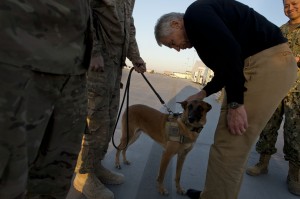Out of Control? NATO to Khan: We Have Nothing to Do With Brennan’s CIA Drone Strikes
One tidbit in the long Washington Post profile of Pakistan’s Imran Khan stands out from the standard language describing the former cricket star who has developed a strong enough political movement to control one province. Just over halfway through the article, we have this description of Khan being summoned to a meeting of NATO diplomats after his blockade of the NATO cargo route through the north of Pakistan had become established:
In a blunt signal of the coalition’s unease, about 20 diplomats from NATO countries, including the United States, summoned Khan for dinner in early December at the German ambassador’s residence in Islamabad. According to Khan and others present, the encounter became tense.
“They kept saying, ‘Look, we have nothing to do with it; it’s all the CIA’ ” carrying out the drone attacks, Khan recalled.
Think about that for a minute. The war in Afghanistan is being fought under the NATO banner. Diplomats representing the top countries in that alliance summoned Khan and then lectured him to stop interfering with their supply convoys. They tried to convince Khan that they, as the leaders of the coalition, have no control over John Brennan’s drone strikes inside Pakistan.
But these strikes, of course, are described by the US as serving to protect US troops within the NATO coalition. And the coalition leaders tell Khan that he should stop his blockade of their supplies because they have no control over the drone strikes that have his constituents so upset. In other words, NATO has no control over John Brennan. He makes his decisions on timing and location of drone strikes with no NATO oversight or even input.
Khan instantly saw the absurd depravity of that argument from NATO. The quote from the Post article above cuts the final sentence from the second paragraph. Here is that sentence, which continues Khan’s description of the meeting to the Post:
“I said, ‘Look, you are all coalition partners.’ ”
Khan understands that in a real coalition, the partners would have a say in actions with as much import as drone strikes. But the NATO representatives, who took it upon themselves to lecture Khan about his blockade, had no objection to Brennan being out of their control. Instead, they were using it as an excuse to try to convince Khan to stop obstructing their convoys.
Who is the one with moral rectitude here? The one who understands how members of a coalition should behave or the one who insists that he needs no oversight on any front for raining down death from the sky?

